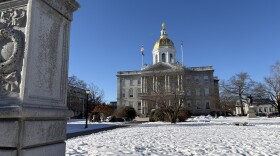The New Hampshire Supreme Court on Friday dealt what may be the final blow to the Northern Pass transmission line.
The justices unanimously affirmed the state Site Evaluation Committee’s 2018 denial of the proposal, ruling that the SEC acted legally in how it rejected the project.
Eversource has spent about $300 million over nearly a decade trying to get the project built. It would have ferried 1,100 megawatts of Canadian hydropower through the White Mountains to the New England grid.
The utility had argued that the SEC didn't fairly consider Northern Pass before rejecting it. The committee said it could not find, based on extensive evidence from Eversource and others, that the project would not disrupt orderly development in its region.
That’s one required criterion for big energy developments in New Hampshire.
Eversource had previously argued the SEC erred by not considering all of those tests before rejecting the project. But the utility’s lawyers conceded that point in their arguments to the state Supreme Court, and so the justices did not address the issue.
But they did reject Eversource’s main argument – saying the SEC was justified in finding the utility had not met its burden of proof on the development issue.
'This is an unfortunate setback to our efforts to advance affordable clean energy in the state.' --Eversource spokesman William Hinkle
The SEC ruling was relatively narrow and did not appear to establish much broader precedent about the SEC process or energy development in the state.
Eversource spokesman William Hinkle said the utility is disappointed by the ruling and will evaluate their options to move forward.
But for the first time, Eversource is referring to its signature project in past tense.
"Northern Pass was the most advanced project to bring abundant, low-cost clean energy into the region,” Hinkle told NHPR Friday. “This is an unfortunate setback to our efforts to advance affordable clean energy in the state."
Hinkle said Eversource believes some new large-scale transmission or generation – potentially with hydropower – will still be necessary to meet future electricity demands in the region, as older power plants retire.
Opponents of Northern Pass disagree. They celebrated Friday's ruling as a long-awaited victory after years spent fighting the power line’s potential environmental and aesthetic impacts.
"We were very proud to stand with thousands of land owners, conservation partner organizations, dozens of communities who all stepped up and said, ‘Look, we like New Hampshire the way it is, we don't want it ruined by something that doesn't do us much good,’" said Jack Savage, spokesman for the Society for the Protection of New Hampshire Forests.
'The Court has made it clear - it is time to move on.' --Gov. Chris Sununu
He said he believes the successful campaign against Northern Pass by residents and nonprofits will be remembered in New Hampshire the same way as Seacoast activists’ fight against a proposed offshore oil refinery in the 1970s.
Savage also said he doesn’t believe energy projects on the scale of Northern Pass are a foregone conclusion for the region’s future. Whatever projects come next, he said he hopes Eversource has learned from its Northern Pass experience.
“What local people care about along the way matters a lot,” Savage said. Utilities "are going to have to figure out a way, and include into the cost of a proposal, building something that is consistent with the vision [of] a given landowner, a given community … with the existing land use.”
The SEC is already on track to review at least one major solar project in the coming months and years, as well as the Granite Bridge natural gas pipeline.
Gov. Chris Sununu, a long-time supporter of Northern Pass who initially said it was “railroaded” by the SEC’s rejection, now appears to be setting his sights toward such future projects.
“The Court has made it clear – it is time to move on,” Sununu said in a statement after Friday’s ruling. “There are still many clean energy projects that lower electric rates to explore and develop for New Hampshire and the rest of New England.”
Meanwhile, Massachusetts is continuing to work toward buying Canadian hydropower from a proposed transmission line in Maine.
That project, from Central Maine Power, is still awaiting final approvals. It was tapped for a long-term contract with the Bay State after Northern Pass, their first choice, stalled.








